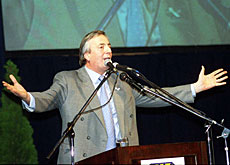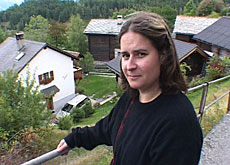Candidate with Swiss roots leads Argentina poll

A descendent of Swiss immigrants to Patagonia is one of the frontrunners to win the presidential elections in Argentina on Sunday.
Néstor Kirchner’s family left Interlaken in the late 19th century and arrived in Buenos Aires in 1884.
The election race is expected to be close and decided in a run-off on May 18. Latest polls show the top candidates are left-leaning Kirchner, free market economist Ricardo Lopez, and former president, Carlos Menem.
If Kirchner were to be elected, it would be the second time in Argentina’s history that a candidate with Swiss roots has become president – the first was Carlos Pellegrini in 1890.
The 52-year-old Kirchner is governor of the province of Santa Cruz, an area rich in oil. The region has the lowest rate of unemployment in the country, which is struggling to pull itself out of an economic crisis.
Kirchner’s connection to Switzerland can be traced back to his maternal grandmother, Berta Althaus Amacher de Kaenel, who was born near Interlaken in canton Bern.
The wanderlust of her paternal grandparents took the entire family to Cape Town in South Africa. But it wasn’t just a desire to see the world that led the Althaus-Amacher clan to decamp – a downturn in the economic situation at the time also influenced their decision.
Swiss colonies
It was during the family’s time in Africa that they became aware of the important Swiss colonies in Argentina. Nostalgia and the possibility of finding themselves among compatriots again pushed them into emigrating for a second time.
Bertha married Teofilo Kaenel – another descendent of Swiss emigrés – in 1896. On his death 16 years later, the young widow was left alone to raise their four children and manage two small family factories: a tannery and cigarette-making plant. She was 35 years old.
She remained in charge until one of her sisters invited her to live with her in a remote Patagonian village, called Río Gallegos in Santa Cruz, 3,000 kilometres from Santa Fe.
Bertha spent the rest of her life there and it was here her eldest daughter married Carlos Kirchner, a local businessman with German roots.
Bertha’s house was the venue for all manner of family reunions and Néstor spent a good part of his childhood there.
Kirchner’s programme
Bertha would be hard-pressed to recognise Río Gallegos today, a modern town which has been run by her grandson for the past five years.
The once basic pioneer village was transformed during the course of 20th century thanks to oil royalties.
Kirchner’s election pledge is to re-build the shattered Argentinian economy while reassuring a poverty-stricken population that their lives won’t get worse. He has also promised to curb political corruption.
His pledges include the construction of three million housing units over three years, generating five million jobs, and restructuring the fiscal system to fight fraud and tax evasion.
Election time
Sunday’s vote is to replace Eduardo Duhalde, who was appointed by the legislative assembly in the aftermath of the country’s economic crash in December 2001.
None of the candidates is expected to take more than 20 per cent of the vote, partly because the ruling Peronists – of whom Kirchner is one – have three candidates running; the others being Menem and Adolfo Rodríguez Saà.
It is the first time in the history of the party that three of its members are pitted against each other.
News that Kirchner, Menem and Lopez were the frontrunners pushed the stock market up to its highest level in five years.
But signs are that ordinary voters have little faith that any of candidates are up to job. “I look at the ballots and see the same names of the people that led us into this crisis,” said one bank employee.
swissinfo, Pierre Dumas (translation: Faryal Mirza)
Néstor Kirchner, 53, is governor of the oil-rich Santa Cruz province in southern Argentina.
He is one of three candidates from the ruling Peronist party.
Former president, Carlos Menem is also running.
None of the candidates is expected to win more than 20 per cent of the vote.
Kirchner faces a tough battle to get elected – surveys show many Argentinians blame his Peronist party for causing the economic crisis.
He has pledged to re-build the shattered Argentinian economy and to curb political corruption.
He has a good record of managing his oil-rich home province, where unemployment is the lowest in the country.
But he must convince sceptical voters, many of whom have seen their life savings wiped out and their incomes fall by 40 per cent in one year.

In compliance with the JTI standards
More: SWI swissinfo.ch certified by the Journalism Trust Initiative



You can find an overview of ongoing debates with our journalists here. Please join us!
If you want to start a conversation about a topic raised in this article or want to report factual errors, email us at english@swissinfo.ch.